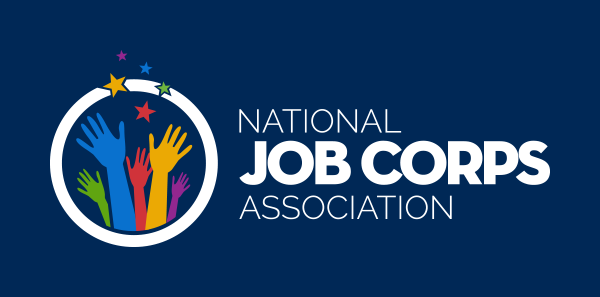Edison Job Corps Academy students from Painting Trade, led by Instructor, Michelle Jewel devoted two days painting the administrative building of the Kiddie Keep Well Camp (KKWC) in Edison, NJ. Kiddie Keep Well Camps is not-for-profit Corporation and a Licensed New Jersey Charity that offers residential camping experience since 1924 to about 600 children between the ages of 6 and 13 who would not normally be able to go to a sleep-away camp each summer.
This community service gave students a great opportunity to practice painting techniques such as: cutting in, rolling and brushing. During the activity students ensured that all areas were covered with drapes to prevent any paint on ground areas. They were focused on their assignment and several students overcame their fear of heights by working on ladders and finishing those hard to get to top areas. OSHA safety training, which students receive as part of the training at the Edison Job Corps, was executed to perfection. In addition three students assisted KKWC staff in painting the camp pool. This was their first experience handling the pool paint. All students were excited about an opportunity to support local community and they truly enjoyed their time helping out.
In Edison Job Corps Academy , students who take Home Builders Institute (H.B.I.) painting trade are exposed to training that consists of protecting adjacent surfaces; basic surface preparation; sealants and repair fillers; low pressure water cleaning; drywall, clear and wood finishing and patching; wall covering; texturizing; decorative finishes; introduction to paints and coating as well as responding to painting failures and remedies; brushing, rolling paints and coatings; ladders, scaffolds, lifts and fall protection and identifying surface/substrate materials in conditions. Those are only few of the many areas students learn in the HBI painting trade. Students gain much of their hands-on experience through projects on academy’s 26 acres campus. With five dorms and numerous buildings students have plenty of opportunities to practice their skills. Significant part of the training, including all training provided at Job Corps, is “green” component of every curriculum known as Training Achievement Record (TAR). Big emphasis is put on utilizing green materials such as zero or low VOC paints and appropriate clean up techniques that prevent pollution.
Painting curriculum, used exclusively by the Home Builders Institute, and approved by the National Office of Job Corps, is designed to the Pre-Apprentice level in line with the registered apprenticeship standards as recognized and trained to by the Home Builders Institute. Training Achievement Record green awareness and green technology task items are based on training and skills standards recognized and used by the National Association of Home Builders (NAHB). Upon completion of training students will be equipped with skills of green training including but not limited to:
• The environmental impacts of green building (e.g., carbon footprint)
• The safety implications unique to green building techniques (e.g., proper ventilation, toxin reduction, improving indoor air quality)
• The concept and importance of constructing a “house as a system” (e.g., proper workflow/integration of trade-specific tasks)
• The importance of energy and water efficiency
• The use of resource efficient materials
• Reducing job-site waste (e.g., reuse and recycling of materials and/or tools)
• The emerging employment opportunities related to green building
• The importance of customer service and homeowner education in properly operating a green home
Job Corps continually upgrades TARs to meet industry expectations. Recently all TARs developed by the Home Builders Institute (HBI) and approved by the Office of Job Corps have been upgraded to support implementation of Job Corps’ Green-Collar Training Initiative and standards-based education and training system to enhance its training capability in the green technology industry. These TARs, which implementation starts on July 1, 2011 are based on national skill and green standards developed collaboratively by builder members of the NAHB, the International Code Council (ICC), and educators.


 JOB CORPS
JOB CORPS 